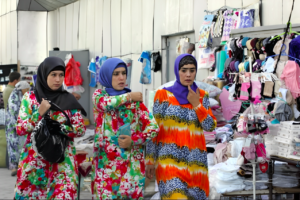Former son-in-law of late dictator Suharto was discharged from military over alleged abuses dating back to 1980s
The presumed election victory of Indonesian presidential candidate Prabowo Subianto – a former army general with a history of alleged involvement in torture and disappearances – marks a dark chapter in the country’s history, activists have warned, while vowing not to give up their fight for justice.
Prabowo, 72, a former special commander under the Suharto dictatorship, is the apparent winner of Indonesia’s presidential election after unofficial counts gave him a strong lead. On Wednesday night he told supporters that his win would be a “victory for all Indonesians”.
The results have provoked fear among activists, however, that accountability for past atrocities will fade even further under Prabowo, and that his future government will have little regard for human rights.
“Winter is coming, whatever the name,” said Usman Hamid, executive director of Amnesty International Indonesia. “But the fight must go on … all of the perpetrators have to be brought to justice.”
Prabowo, a former son-in-law of Suharto, was a longtime commander in the Kopassus special forces, but was discharged from the military after Kopassus soldiers kidnapped and tortured political activists in 1998.
Of 22 activists kidnapped that year, 13 are still missing. Prabowo always denied wrongdoing and has never been charged in relation to the allegations, though several of his men were tried and convicted. Prabowo was previously banned from entering the US.
Prabowo is also accused of involvement in rights abuses in Papua and Timor-Leste, including a 1983 massacre in which hundreds of people, most of them men, were killed in the Timorese village of Kraras. He has denied the allegations.
Muhammad Isnur, head of the Legal Aid Institute Foundation of Indonesia (YLBHI), said the election of Prabowo may be “too painful” for the families of those who disappeared in 1998, who are still fighting for justice.
“The result is as we predicted. But we are still disappointed,” he said.
Prabowo had maintained a lead in pre-election surveys after rebranding himself as a cuddly grandpa-like figure and securing the tacit support of the outgoing president, Joko Widodo, whose son ran alongside Prabowo for the vice-presidency. The incumbent president, who is known as Jokowi, was accused of unfairly boosting Prabowo’s campaign in order to safeguard his legacy and establish a dynasty.
“Too many intricate enabling conditions and manipulations have shown the involvement of Jokowi in the election. He had mobilised everything. That’s why the result is predictable,” said Muhammad. Jokowi’s office has denied that he sought to interfere in the election.
Academics, journalists and civil society groups should prepare for the worst, Muhammad said. “We need to be aware of every risk that could happen to us in the future and try to make a list of mitigations. We need to be prepared.”
In the runup to the election, Prabowo was the only presidential candidate who did not attend a press freedom event and did not respond to a questionnaire by Human Rights Watch on key rights issues facing Indonesians.
As results emerged on Wednesday, Veronica Koman, a human rights lawyer living in exile in Australia, wrote on Twitter/X: “Many Indonesians are saying that they want to leave the country because Prabowo is winning – similar phenomenon to US citizens when Trump was winning. The big difference is … ours is out of FEAR.”
On Wednesday night, Prabowo told supporters “this win shall be a win for Indonesian people” as he promised to govern for everyone “whatever the ethnicity, whatever the province, whatever the religion, whatever their social background”.
Prabowo added that there was a need to wait for an official result from election authorities.
Source: The Guardian











